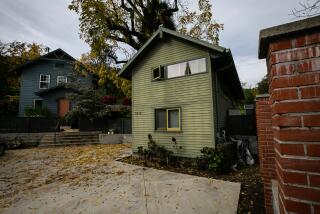Q&A: Home seller seeks refund of unspent money in association’s reserve account
- Share via
Question: We just opened escrow on the sale of our home in a small common interest development. We’ve spent a lot of money on homeowner association dues over the years and have learned our association has stockpiled more than a million dollars in reserve money. I’ve asked the board to refund our portion of that unspent money, but it refuses to do so.
Shouldn’t the association refund our share of that reserve money when we sell and transfer ownership? Since we will not derive any benefit from that unspent money, can we write it off on our taxes as a gift or donation to the association?
SIGN UP for the free California Inc. business newsletter >>
Answer: Unfortunately, the association’s reserve fund is an asset of the association and not a repository for money earmarked for individual titleholders. For that reason, it cannot be refunded. Gifts or donations indicate volitional payments. Reserves are not volitional; they are approved by the board and assessed against each titleholder.
The board has an obligation to manage and use reserve fund monies properly, and as long as you are an association member, this should bestow on you a direct benefit.
Although you cannot withdraw your portion of reserve payments, an adequate reserve account might be an advantage at the time of sale or refinancing. Some lenders may require a reserve account even though the common interest development act does not.
Also, some covenants, conditions and restrictions may require an association to create and fund a reserve account, while others do not. Sellers might highlight reserves as a means of substantiating their asking price.
On the other hand, if an association stockpiles money in a reserve account that it doesn’t use while allowing maintenance problems to accumulate, this could indicate poor management.
Although there are no guarantees, a prospective purchaser may have greater assurances against unexpected special and emergency assessments if maintenance issues are an ongoing board priority. Obviously, an association with a great deal of money at the ready may have greater flexibility in handling maintenance issues and emergency situations.
If your buyer reviewed the association’s financials, you may already be receiving an indirect benefit from the current reserve balance — It may have been a key factor in your buyer’s decision to make the purchase.
If a reserve fund exists, Civil Code Section 5510 is clear on the permissible uses of reserve funds; namely, the repair, restoration, replacement or maintenance of major components that the association is obligated to repair, restore, replace or maintain and for which the reserve fund was established — or on litigation involving these permissible uses.
The law does not include a means of titleholders cashing out from the association’s reserves when they sell their property. Rather, the funds remain the property of the association you are leaving and continue to be maintained and used for the benefit of all owners.
Unless you are renting out your property, homeowner association assessments are not tax deductible. Titleholders should consult with an accountant regarding possible write-offs for prior payments made to your association’s reserve account.
It is extremely unlikely that any of your past association assessment payments will qualify as a tax or a gift to the association. Ownership in a common interest development controlled by a homeowner association with an elected board of directors means that all owner payments are the cost of doing business.
Zachary Levine, a partner at Wolk & Levine, a business and intellectual property law firm, co-wrote this column. Vanitzian is an arbitrator and mediator. Send questions to Donie Vanitzian, JD, P.O. Box 10490, Marina del Rey, CA 90295 or noexit@mindspring.com.
More to Read
Inside the business of entertainment
The Wide Shot brings you news, analysis and insights on everything from streaming wars to production — and what it all means for the future.
You may occasionally receive promotional content from the Los Angeles Times.










